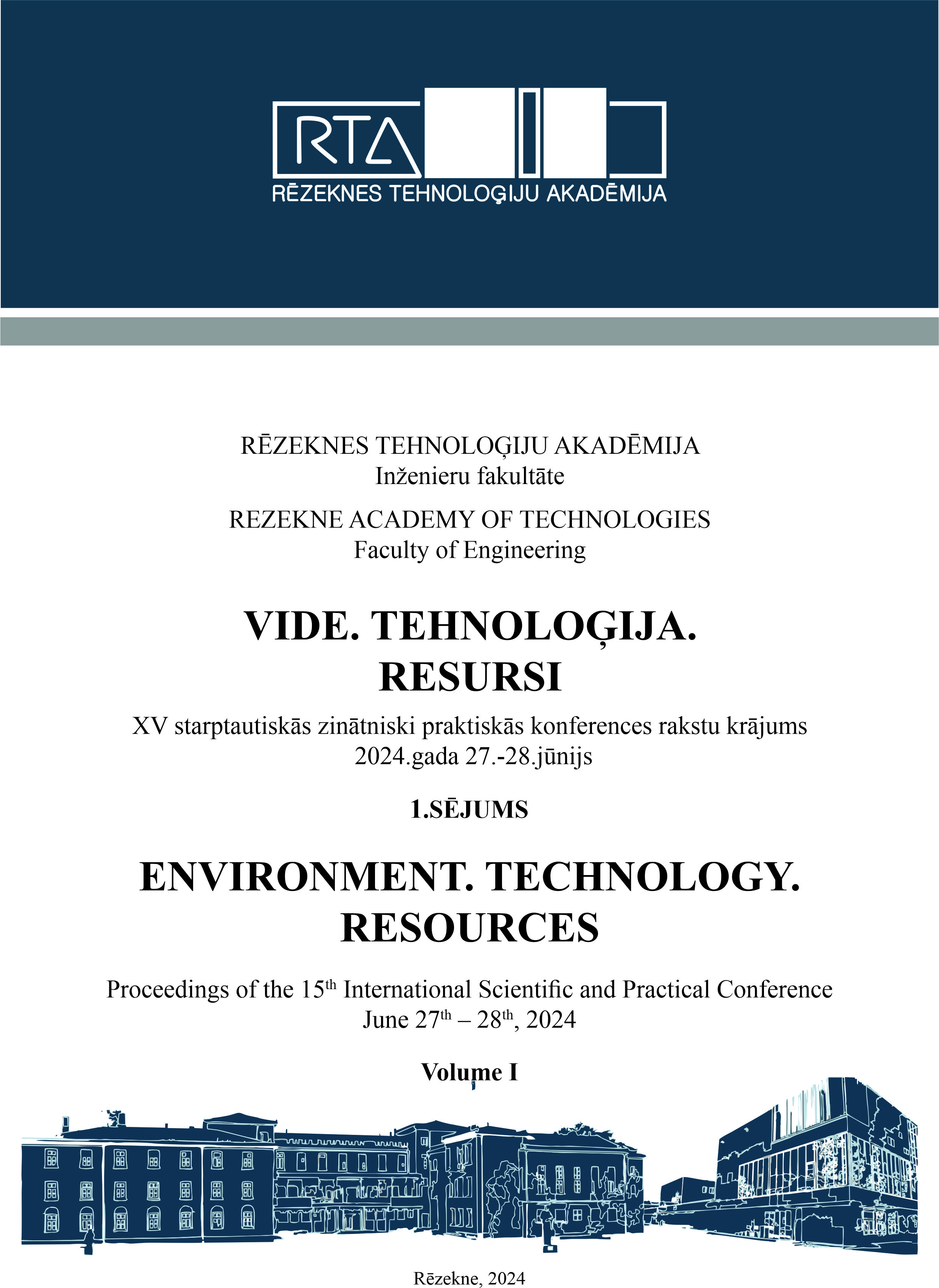THE BUSINESS MODEL OF ALTERNATIVE FOOD NETWORKS IN BULGARIA
DOI:
https://doi.org/10.17770/etr2024vol1.7951Keywords:
alternative food networks, living labs, sustainable supply chainsAbstract
The paper examines the alternative food networks in the agri-food sector in their variety of forms focusing on the issue of sustainable production and consumption, and particularly high quality and safety of products. Special attention is paid to the development of organic production and the potential to integrate it with some types of alternative food networks in Bulgaria. The study was implemented at the INVEST Regional Living Lab in Bulgaria under the research task of Alternative food chains and new business models. The focus on the development process of open innovations in the living lab predetermined the use of the participatory approach in the quadruple helix of research work. The opportunities of students’ involvement are of special consideration, particularly emphasizing the need of new training programs and approaches oriented towards the real business and practice for capacity building in sustainable rural development. The paper presents a business model for development of an alternative food network in Bulgaria considering the main characteristics of the spatial, social and economic proximity in short production and distribution chains. The model envisages students’ engagement in the main activities of an entrepreneurial initiative in University of agribusiness and rural development.
Downloads
References
Offnews.bg, “The chains are pulling 100 skins from the back of the Bulgarian producer”, August, 2012. [Online]. Available: https://offnews.bg/analizi/verigite-smakvat-po-100-kozhi-ot-garba-na-balgarskia-proizvoditel-85908.html. [Accessed Feb. 28, 2024].
J. Murdoch, T. Marsden and J. Banks, “Quality, nature, and embeddedness: some theoretical considerations in the context of the food sector”, Economic Geography, vol. 76, no 2, pp. 107-125, April 2000. [Online], Available: https://doi.org/10.2307/144549. [Accessed Feb. 28, 2024].
L. Kebir and A. Torre, “Geographical proximity and new short food supply chains”, Creative Industries and Innovation in Europe. L Lazzeretti (Ed.). Routledge, London, 2012, p. 328. 2012. [Online], Available: https://www.taylorfrancis.com/chapters/edit/10.4324/9780203112571-19/geographical-proximity-new-short-supply-food-chains-le%C3%AFla-kebir-andr%C3%A9-torre. [Accessed Feb. 28, 2024].
T. Marsden, J. Banks and G. Bristow, “Food Supply Chain Approaches: Exploring their Role in Rural Development”, European, Sociologia Ruralis, vol. 40, no 4, pp. 424-438, October 2000. [Online], Available: https://doi.org/10.1111/1467-9523.00158. [Accessed Feb. 28, 2024].
E. Carmen, I. Fazey, H. Ross, M. Bedinger, F. M. Smith, K. Prager, K. McClymont and D. Morrison, “Building community resilience in a context of climate change: The role of social capital”, Ambio, vol. 51, pp. 1371–1387, Jabuary 2022. [Online], Available: https://doi.org/10.1007/s13280-021-01678-9. [Accessed Feb. 28, 2024].
R. Matacena, “Linking alternative food networks and urban food policy: a step forward in the transition towards a sustainable and equitable food system?” International Review of Social Research, vol. 6, no 1, pp. 49–58, April 2016. [Online], Available: https://boa.unimib.it/retrieve/e39773b3-50c0-35a3-e053-3a05fe0aac26/%5BInternational%20Review%20of%20Social%20Research%5D%20Linking%20alternative%20food%20networks%20and%20urban%20food%20policy-%20a%20step%20forward%20in%20the%20transition%20towards%20a%20sustainable%20and%20equitable%20food%20system-.pdf. [Accessed Feb. 28, 2024].
F. Barbera and J. Dagnes, “Building alternatives from the bottom-up: The case of alternative food networks”, Agriculture and Agricultural Science Procedia, vol. 8, pp. 324-331, 2016. [Online], Available: https://www.sciencedirect.com/science/article/pii/S2210784316300274. [Accessed Feb. 28, 2024].
H. Renting, T. K. Marsden, J. Banks, “Understanding alternative food networks: exploring the role of short food supply chains in rural development”, Environment and Planning A 2003, vol. 35, pp. 393-411, 2003. [Online], Available: https://citeseerx.ist.psu.edu/document?repid=rep1&type=pdf&doi=1d59fdac6e5f66479190e17633266f2718d70bb5. [Accessed Feb. 28, 2024].
C. E. Tozer, “Alternative food networks and value creation: The case of farmers markets in New Zealand”, Thesis in Massey University, 2013. [Online], Available: https://mro.massey.ac.nz/server/api/core/bitstreams/b01ae525-9d84-408d-a293-76b28cf5da57/content. [Accessed Feb. 28, 2024].
E. Arabska, Farmers' markets - a successful business model for sustainable agri-food systems, Academic publishing house “Talent”, University of agribusiness and rural development, Plovdiv.
E. Bos and L. Owen, “Virtual reconnection: The online spaces of alternative food networks in England”, Journal of Rural Studies, vol. 45, pp. 1-14, June 2016. [Online], Available: https://www.sciencedirect.com/science/article/pii/S0743016716300316. [Accessed Feb. 28, 2024].
Ministry of agriculture and food, “National action program to contribute to the goals of the Farm to fork strategy by 2030: Project”. [Online]. Available: https://www.mzh.government.bg/media/filer_public/2023/08/28/reforma_s6r1_programa_mzkh_-_proekt.pdf, [Accessed: Feb. 26, 2024].
Vitosha Research, “Production, distribution and consumption of organic products in Bulgaria (results of a marketing survey)”, Sofia, 2009. [Online]. Available: https://www.mzh.government.bg/media/filer_public/2018/02/08/report_bioproducts_last.pdf. [Accessed: Feb. 26, 2024].
Ministry of agriculture and food, “Development of organic production in Bulgaria to 2016”. [Online]. Available: https://www.mzh.government.bg/media/filer_public/2018/05/17/razvitie_na_biologichnoto_proizvodstvo_v_blgariia_prez_2016_g.pdf. [Accessed: Feb. 26, 2024].
News.bg, “A new regulation regulates the trade in homemade food”, October 2022. [Online]. Available: https://news.bg/society/nova-naredba-reglamentira-targoviyata-s-domashni-hrani.html. [Accessed Feb. 28, 2024].
What is a business model? (Plus, how to define yours), September 2023. [Online]. Available: https://www.aha.io/roadmapping/guide/product-strategy/what-are-some-examples-of-a-business-model. [Accessed Feb. 28, 2024].
Downloads
Published
Issue
Section
License
Copyright (c) 2024 Ekaterina Arabska, Svetla Dimitrova, Aleksandar Davchev, Dimitar Yakimov, Plamen Lakov

This work is licensed under a Creative Commons Attribution 4.0 International License.



